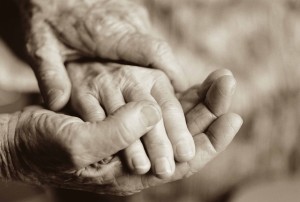Dealing with the grief of an aging parent.
Photo from Bing images
Dealing with the grief of Aging Parents
What are some of your favorite memories of your parents from when you were younger? Are they of playing sports with your father out in the lawn or going on fishing weekends together? Perhaps they are of your mother baking up batches of your favorite cookies and spending hours crocheting afghans for every member of the family. If you are like many family caregivers, you have many of these treasured memories, but when you look at your parents now you have difficulty connecting those memories with the seniors for whom you are providing care.
Elderly adults, particularly those who are coping with cognitive limitations and challenges such as from Alzheimer’s disease or another form of dementia, often seem like very different people from the people that you remember them being when they were younger, making it emotionally challenging for you as you continue to care for them even while missing the parents who you loved so much when you were younger. By taking the time to purposefully and thoroughly grieve the parents you had when you, and they, were younger you can release yourself of some of these difficult emotions and dedicate yourself fully and completely to being the best caregiver possible for the people they are now.
Here are some tips to help you grieve the parents of your memories so that you can continue forward with the parents of your current journey:
• Be realistic about your perceptions. Have you ever heard someone describing their father as the biggest, strongest man they have ever seen, only to meet him and realize that he is actually of average height and below average fitness? It is not uncommon for children to have unrealistic perceptions of their parents built on the love and adoration they have for those adults. If you feel like your parents have changed a considerable amount, take some time to evaluate whether they have truly changed, or if your perceptions of them from when you were a child were skewed. Acknowledging these perceptions can help you to realize that your parents are far less different than you thought they were, easing the stress and helping you to connect more deeply.
• Relive those memories. If your seniors have undergone major changes due to the challenges and limitations that they face in their elder years, allow yourself the time to relive your memories of them and to grieve. Though it seems morbid to grieve your parents when they are still alive, the truth is that when you allow yourself to work through the challenging emotions of letting go of someone who is never going to be the same, you free yourself and enable yourself to create relationships and bonds that otherwise could not have existed.
• Actively love them. It is not your parents’ fault that they are not the same as they were when they were younger, and it should not impact the quality of care that you give them. Allow yourself to let go of what you think your parents “should” be and embrace who they are now so that you can actively, purposefully, and honestly love them throughout your care journey. This means learning more about them and tailoring your care to their needs and personalities now rather than then.
content from Tom Smith @ Alpine Home Care
“To care for those who once cared for us is one of the highest honors” Tia Walker


